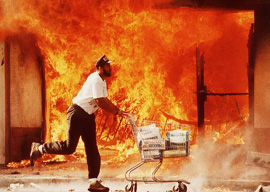
August 11, 2011

The racial issue will inevitably come up for reexamination, and the difference between the two cities is nowhere clearer than on this topic. Save for some synthetic things such as Kwanzaa, American blacks have nothing more to do with Africa than their skin color. Culturally, they are more American than anyone else save the Indians—precisely because of their arrival’s traumatic manner and the nature of the “peculiar institution” that produced their culture. Although Europeans have long and often (and not without some justification) sniped away at American racial attitudes, the truth is that in American society, white culture is inextricably bound up with black culture—and not just for lovers of jazz, blues, and soul food. Reconstruction begat Jim Crow, which begat “white guilt,” without which we would have a different head of state. Race riots are as much a part of our culture as Br’er Rabbit (if nowhere as much fun); they may be horrible, but they are familiar.
Britain’s Afro-Caribbean folk are a different matter. They came willingly to the seat of empire and have not been there long. There is an extremely different dynamic between them and the wider society than there is between their remote cousins in America and the mainstream there. The racial division is complicated by their status as “invader.” (Witness Enoch Powell’s “Rivers of Blood” speech and the reactions thereto.) Ironically, Afro-Caribbeans who come to the United States—whether from Britain or their homelands—often do better than local blacks economically, in part thanks to their British-style education. This gains them the resentment of the latter, upon whom they in turn frequently look down.
Much will be made of the police’s role in the riots’ commencement, as it was here. Police are rarely gentle in crime-ridden neighborhoods, but this is often overlooked until and unless race is introduced into the equation. In the LA suburb of Fullerton on July 5, six police officers beat an unarmed homeless man into a coma. He subsequently died. Fortunately for public order, the victim was not only white, he was the son of a retired sheriff’s deputy. There has been public outrage, but no rioting. Had Mark Duggan been white, one supposes there would have been the same result in London as there was in Fullerton.
There will be many questions raised in London as to the riots’ underlying causes—education, poverty, innate criminality, and so on. At the time of the 1992 riots, I was the Los Angeles correspondent for a black magazine based in Lafayette, Louisiana. I was also their only white writer. Much was said in the press of all colors about how the riots were the result of oppression, despair, and so on. But my column queried my readers: “How oppressed do I have to be for you to feel I have a right to burn YOUR home or business?” Not being insane, my readership responded unanimously, “Never.” Good sense is not restricted along racial lines.